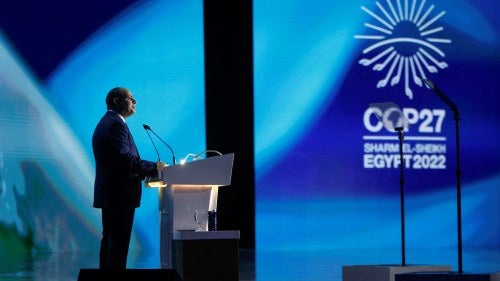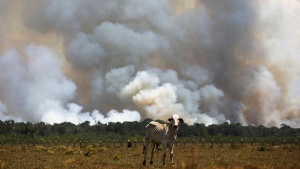On Climate, Don't Let Gloom Lead to Doom

While understandable, the mood of pessimism around COP27 obscures progress toward net zero and can be dangerously self-fulfilling, argues Chris Morris.
There’s been a lot of talk in the last few years about the politics of hope and the politics of fear. We’ve been hearing it again in the run-up to the midterm elections in the United States.
A message of hope has to acknowledge that long-term upheavals are complex and difficult to manage, and that sketching out a vision of a better future needs to be rooted in realism. Fear tends to promise short-term quick fixes, which rarely solve anything.
This has direct relevance for the climate crisis, the most urgent long-term issue we face. It is undeniably existential, a debate about our future on this planet, as well as the planet itself. And as the 27th Conference of the Parties to the United Nations Framework Convention on Climate Change (better known as COP27) gets underway in Egypt with dire warnings of climate chaos, there is a lot to be fearful about.
But we can’t afford to allow the gloom to lead to doom, and we shouldn’t lose hope.
This is not an attempt to sugarcoat the terrifying statistics which the world’s best scientists continue to reveal: the past eight years are on track to be the warmest on record, and as the Conference began only 29 of 194 countries had fulfilled their promise to submit more ambitious carbon-reduction plans.
Nor is it an attempt to ignore the alarming pace at which our climate is already changing, as a result of the man-made warming that has occurred so far: sea levels are continuing to rise, lethal heatwaves are getting hotter, and glaciers are melting at record rates.
So the UN Secretary General is right on the money when he says our planet is sending a distress signal. Global temperatures are already about 1.15 degrees Celsius above pre-industrial levels and rising.
And this is the decade when decisive climate action was supposed to be taken. Ambitious targets were set for 2030, including a 45 percent reduction in global carbon emissions on the path to net zero. Then came the COVID pandemic, followed by the war in Ukraine, both causing immense suffering and bringing huge economic hardship.
Three years of the 2020s are already gone, attention is too often diverted from the climate, and humanity is way off target. Far from declining, greenhouse gas levels in the atmosphere reached record highs in 2021, according to the World Meteorological Association.
“More bad news,” it said, “for the planet.”
So, the numbers are sobering, but all is not lost. We must continue to have confidence in our ability to change the way our world is run. That means it is vital to highlight positive developments, where the politics of hope have made progress.
Governments and businesses are investing extraordinary amounts in the green revolution. Whatever happens in the midterm elections, the United States is going to be spending staggering sums of money on decarbonizing its economy in the coming years, and it is not alone.
Climate deniers lost power in Australia in May, in a "greenslide" election in which a majority of voters accepted the basic promise that the long-term benefits of acting on the climate crisis far outweigh the costs.
It may seem an obvious point, but it is important to defeat the argument that decarbonizing the world is too expensive and too complex to contemplate. In the words of the British Labour party politician Ed Miliband, it really is cheaper to save the planet than to destroy it.
Another big step was taken last month, when Jair Bolsonaro and his plans for deforesting the Amazon were rejected by the Brazilian people as he attempted to win re-election as President.
The margin was extremely narrow (more than 58 million people voted for Bolsonaro and his policies of climate denial), and that is the jeopardy of democratic politics. Sometimes the other side wins. But this time in Brazil, the politics of hope defeated the politics of fear.
Luiz Inácio Lula da Silva"Brazil is ready to resume its leading role in the fight against the climate crisis, protecting all our biomes, especially the Amazon Forest."
That is another cause for celebration, in the most biodiverse country on earth. A Bolsonaro win would have made it almost impossible to meet the global pledge, agreed at COP26 in Glasgow, to end deforestation by 2030.
It is a window of opportunity that must be embraced, because it may not last long. We know too well that windows can be closed as well as opened.
Where else can we turn for good news? To the extraordinary innovation in green technology, to the activism of a young generation of climate leaders, and to the fact that our addiction to coal is coming to an end.
In fact, the International Energy Agency (IEA) says it thinks global carbon emissions from energy will peak in 2025, as governments rush to invest in clean fuel sources. Crucially, Russia’s war in Ukraine is accelerating that process, not slowing it down.
The current energy crisis, caused by the Russian invasion, has prompted a series of predictions that fossil fuel production will have to rise in response. But the IEA says precisely the opposite is happening. It predicts the global demand for fossil fuels will peak in the middle of this decade.
Just think about that for a moment. It suggests Russia is cutting off its nose to spite its face. And Big Oil’s charm offensive in favor of fossil fuels isn’t working.
There will be blips; in fact we’re in the middle of one at the moment. New coal-fired power plants are still being built in China, India, and elsewhere. But the direction of travel is clear. Fossil fuels are a dying breed. China, it should be noted, is also building far more renewable energy capacity than anyone else.
The trouble is the transition away from fossil fuels is still not happening quickly enough. The UN says there is no credible pathway at the moment to keeping the rise in global temperatures to 1.5 degrees Celsius above pre-industrial levels, avoiding the worst effects of climate breakdown.
In its Emissions Gap Report, the UN says current policies will lead to global warming of 2.8 degrees this century—with alarming consequences. Even if new pledges, yet to be enacted, come into full effect, the planet will still warm by more than 2 degrees.
It means much more needs to be done. And the transition away from an economy based on carbon needs to happen far more quickly.
Why aren’t we talking about this all the time? Partly because climate communications are a strange beast. The world’s most important issue has a habit of disappearing from the headlines for months on end, until a flurry of reports appear within days of each other, just before the annual COP meeting begins.
So, the stark warnings from the UN and others need to be amplified and acted upon. But so do the benefits of a transition to net-zero carbon emissions by 2050. Renewable energy sources such as solar and wind are cheaper than fossil fuels, and a recent study by scientists from Oxford University and elsewhere concluded that a rapid green energy transition will likely result in trillions of dollars of net savings.
To be clear, the faster the transition, the higher the savings will be. The race to net zero, in other words, is not a sacrifice. It is a massive opportunity.
It is also a necessity, and we should not lose sight of that. In most parts of the world the climate is not only changing, it has already changed. There have been record-breaking floods in Pakistan, affecting about a third of the country, and drought in East Africa is threatening tens of millions of people with famine.
That is one of the grim reasons why money will rightly dominate much of the discussion at COP27. Poorer countries, who have contributed virtually nothing to the dangerous increase in greenhouse gas emissions over the last hundred years, are suffering from its worst effects.
They need huge and sustained financial help to survive. And they argue with justification that the countries which did the most to cause global warming also need to do the most to deal with its consequences. That will, to reemphasize the point, be a good investment for everyone.
The urgency of the argument is essential, the challenges are enormous, and many climate scientists are on the brink of despair. They can’t understand why we’re not listening hard enough, why we’re not acting more rapidly.
But any good news on climate should also be celebrated, and shouted from the rooftops, as part of a positive vision for the future. Otherwise, climate doom-ism will win.


Related Content

Founder of the Rise Up Climate Movement Vanessa Nakate discusses the global climate crisis and the importance of elevating the next generation of underrepresented environmental leaders with Jamia Jowers.

Can the United States deliver on its food systems and climate commitments? We offer recommendations to protect the planet and feed the world.

